The Extent of Judicial Law-Making in the English Legal System
VerifiedAdded on 2023/06/11
|12
|3471
|420
Essay
AI Summary
This essay examines the role of judges in the English Legal System, focusing on the extent to which they make law through common law, precedent, and statutory interpretation. It discusses the traditional view of Parliament as the primary law-making body and the judiciary's role in interpreting laws, contrasting it with the modern reality where judges actively shape the law. The essay explores the doctrine of stare decisis, equitable maxims, and statutory interpretation rules (literal, golden, and mischief) to illustrate how judges fill gaps in legislation and adapt laws to new circumstances. Landmark cases like A.G. v Butterworth, Ghaidan v Godin Mendoza, Factortame, and R v Dica are analyzed to demonstrate judicial discretion and the impact of the Human Rights Act 1998. Ultimately, the essay argues that while Parliament holds the primary law-making power, judges significantly contribute to the legal landscape through their interpretative and precedent-setting roles.
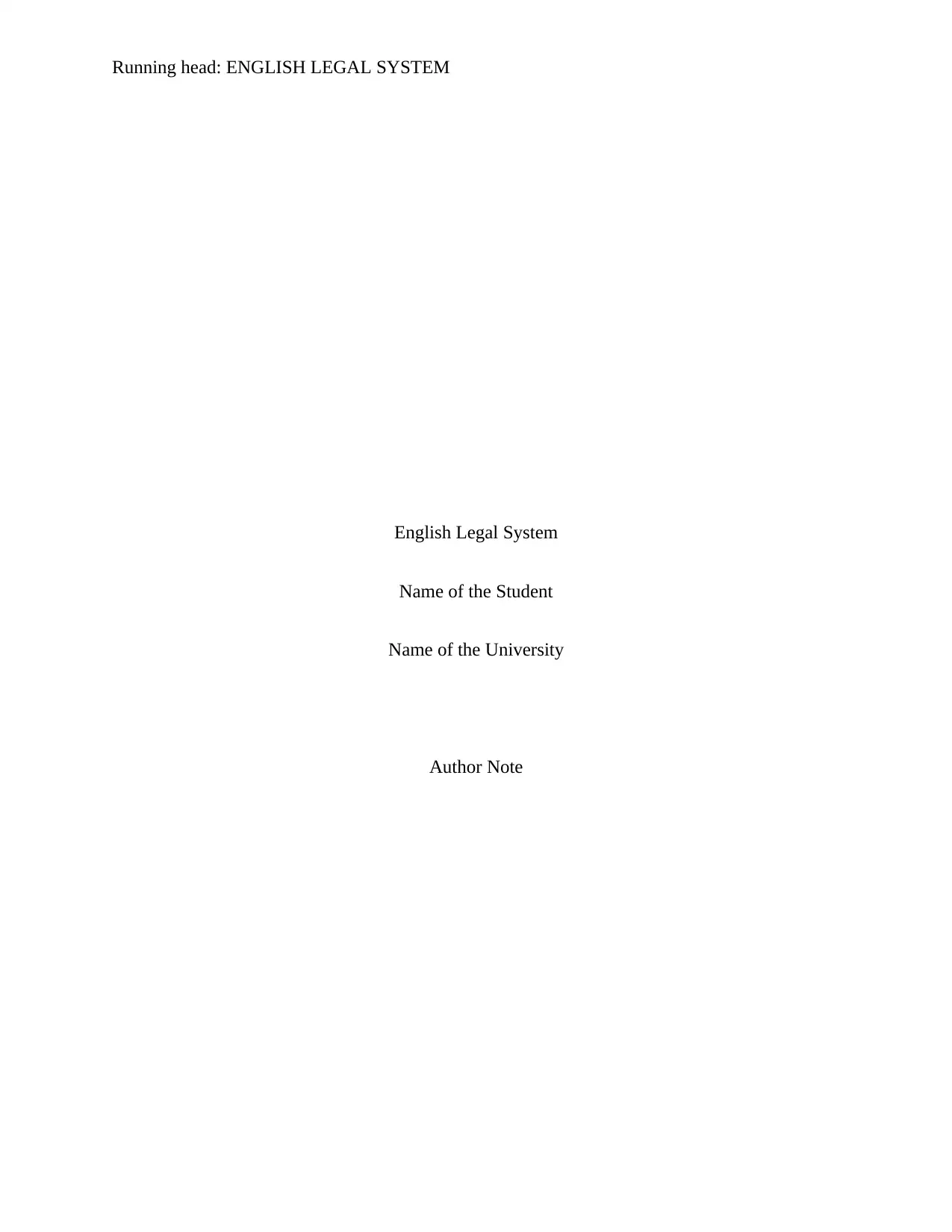
Running head: ENGLISH LEGAL SYSTEM
English Legal System
Name of the Student
Name of the University
Author Note
English Legal System
Name of the Student
Name of the University
Author Note
Paraphrase This Document
Need a fresh take? Get an instant paraphrase of this document with our AI Paraphraser
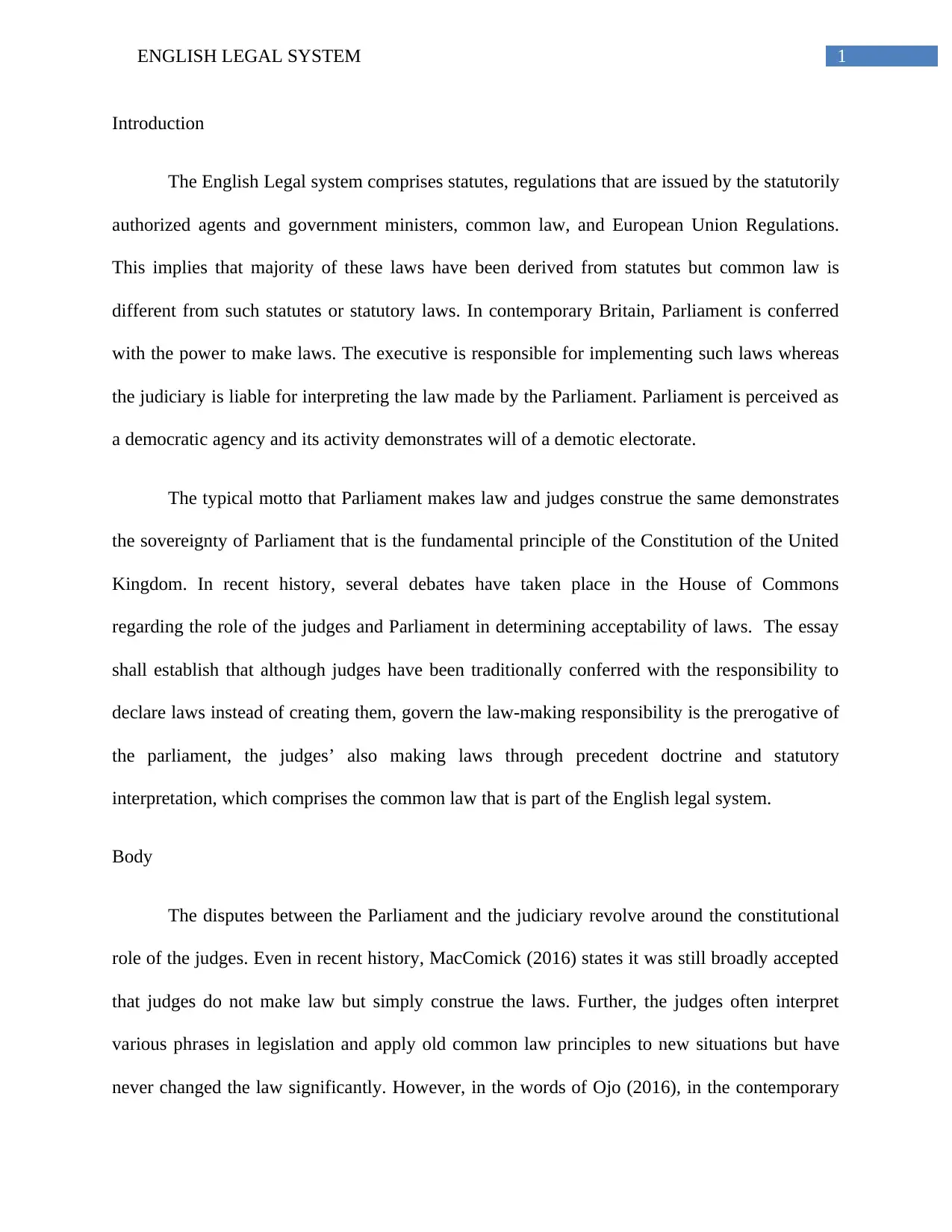
1ENGLISH LEGAL SYSTEM
Introduction
The English Legal system comprises statutes, regulations that are issued by the statutorily
authorized agents and government ministers, common law, and European Union Regulations.
This implies that majority of these laws have been derived from statutes but common law is
different from such statutes or statutory laws. In contemporary Britain, Parliament is conferred
with the power to make laws. The executive is responsible for implementing such laws whereas
the judiciary is liable for interpreting the law made by the Parliament. Parliament is perceived as
a democratic agency and its activity demonstrates will of a demotic electorate.
The typical motto that Parliament makes law and judges construe the same demonstrates
the sovereignty of Parliament that is the fundamental principle of the Constitution of the United
Kingdom. In recent history, several debates have taken place in the House of Commons
regarding the role of the judges and Parliament in determining acceptability of laws. The essay
shall establish that although judges have been traditionally conferred with the responsibility to
declare laws instead of creating them, govern the law-making responsibility is the prerogative of
the parliament, the judges’ also making laws through precedent doctrine and statutory
interpretation, which comprises the common law that is part of the English legal system.
Body
The disputes between the Parliament and the judiciary revolve around the constitutional
role of the judges. Even in recent history, MacComick (2016) states it was still broadly accepted
that judges do not make law but simply construe the laws. Further, the judges often interpret
various phrases in legislation and apply old common law principles to new situations but have
never changed the law significantly. However, in the words of Ojo (2016), in the contemporary
Introduction
The English Legal system comprises statutes, regulations that are issued by the statutorily
authorized agents and government ministers, common law, and European Union Regulations.
This implies that majority of these laws have been derived from statutes but common law is
different from such statutes or statutory laws. In contemporary Britain, Parliament is conferred
with the power to make laws. The executive is responsible for implementing such laws whereas
the judiciary is liable for interpreting the law made by the Parliament. Parliament is perceived as
a democratic agency and its activity demonstrates will of a demotic electorate.
The typical motto that Parliament makes law and judges construe the same demonstrates
the sovereignty of Parliament that is the fundamental principle of the Constitution of the United
Kingdom. In recent history, several debates have taken place in the House of Commons
regarding the role of the judges and Parliament in determining acceptability of laws. The essay
shall establish that although judges have been traditionally conferred with the responsibility to
declare laws instead of creating them, govern the law-making responsibility is the prerogative of
the parliament, the judges’ also making laws through precedent doctrine and statutory
interpretation, which comprises the common law that is part of the English legal system.
Body
The disputes between the Parliament and the judiciary revolve around the constitutional
role of the judges. Even in recent history, MacComick (2016) states it was still broadly accepted
that judges do not make law but simply construe the laws. Further, the judges often interpret
various phrases in legislation and apply old common law principles to new situations but have
never changed the law significantly. However, in the words of Ojo (2016), in the contemporary
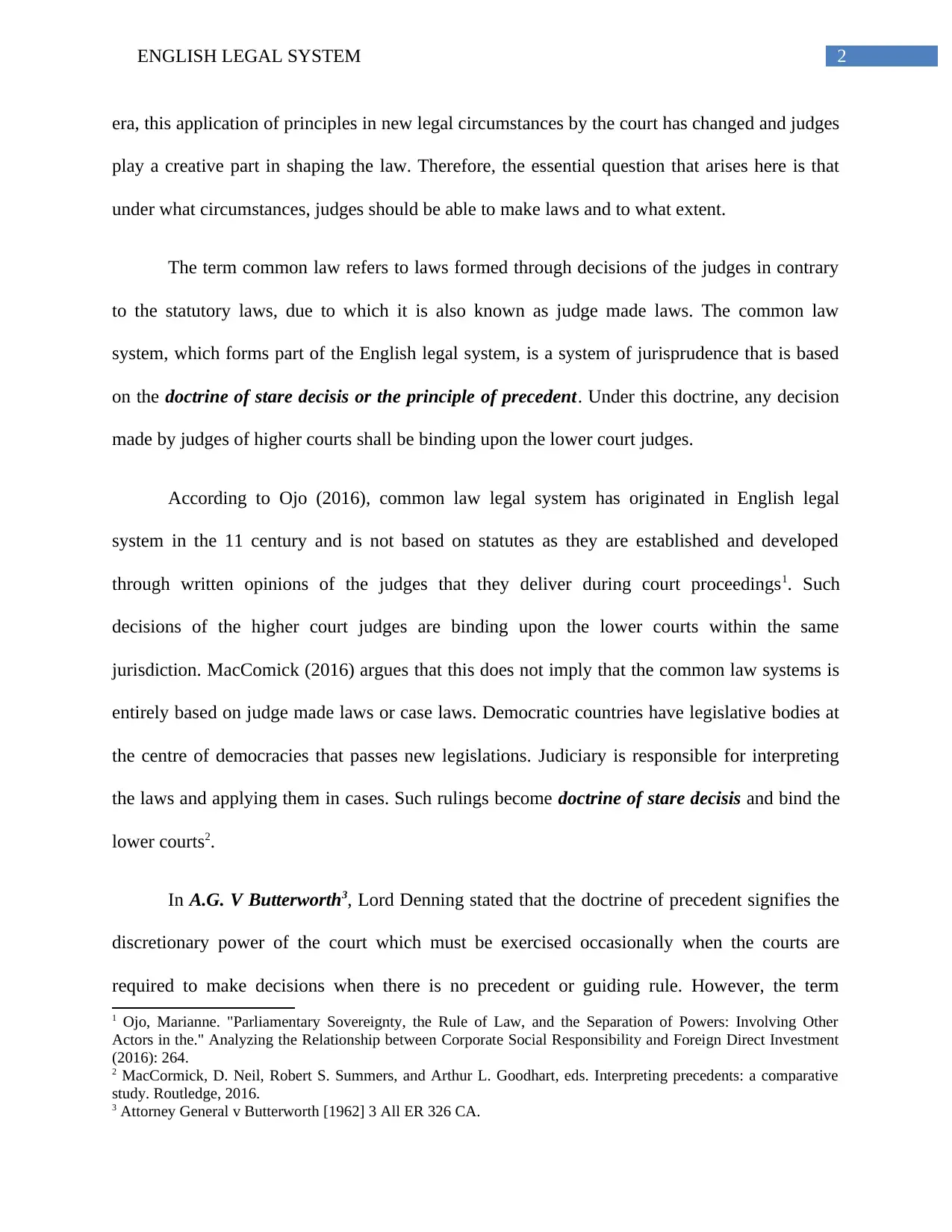
2ENGLISH LEGAL SYSTEM
era, this application of principles in new legal circumstances by the court has changed and judges
play a creative part in shaping the law. Therefore, the essential question that arises here is that
under what circumstances, judges should be able to make laws and to what extent.
The term common law refers to laws formed through decisions of the judges in contrary
to the statutory laws, due to which it is also known as judge made laws. The common law
system, which forms part of the English legal system, is a system of jurisprudence that is based
on the doctrine of stare decisis or the principle of precedent. Under this doctrine, any decision
made by judges of higher courts shall be binding upon the lower court judges.
According to Ojo (2016), common law legal system has originated in English legal
system in the 11 century and is not based on statutes as they are established and developed
through written opinions of the judges that they deliver during court proceedings1. Such
decisions of the higher court judges are binding upon the lower courts within the same
jurisdiction. MacComick (2016) argues that this does not imply that the common law systems is
entirely based on judge made laws or case laws. Democratic countries have legislative bodies at
the centre of democracies that passes new legislations. Judiciary is responsible for interpreting
the laws and applying them in cases. Such rulings become doctrine of stare decisis and bind the
lower courts2.
In A.G. V Butterworth3, Lord Denning stated that the doctrine of precedent signifies the
discretionary power of the court which must be exercised occasionally when the courts are
required to make decisions when there is no precedent or guiding rule. However, the term
1 Ojo, Marianne. "Parliamentary Sovereignty, the Rule of Law, and the Separation of Powers: Involving Other
Actors in the." Analyzing the Relationship between Corporate Social Responsibility and Foreign Direct Investment
(2016): 264.
2 MacCormick, D. Neil, Robert S. Summers, and Arthur L. Goodhart, eds. Interpreting precedents: a comparative
study. Routledge, 2016.
3 Attorney General v Butterworth [1962] 3 All ER 326 CA.
era, this application of principles in new legal circumstances by the court has changed and judges
play a creative part in shaping the law. Therefore, the essential question that arises here is that
under what circumstances, judges should be able to make laws and to what extent.
The term common law refers to laws formed through decisions of the judges in contrary
to the statutory laws, due to which it is also known as judge made laws. The common law
system, which forms part of the English legal system, is a system of jurisprudence that is based
on the doctrine of stare decisis or the principle of precedent. Under this doctrine, any decision
made by judges of higher courts shall be binding upon the lower court judges.
According to Ojo (2016), common law legal system has originated in English legal
system in the 11 century and is not based on statutes as they are established and developed
through written opinions of the judges that they deliver during court proceedings1. Such
decisions of the higher court judges are binding upon the lower courts within the same
jurisdiction. MacComick (2016) argues that this does not imply that the common law systems is
entirely based on judge made laws or case laws. Democratic countries have legislative bodies at
the centre of democracies that passes new legislations. Judiciary is responsible for interpreting
the laws and applying them in cases. Such rulings become doctrine of stare decisis and bind the
lower courts2.
In A.G. V Butterworth3, Lord Denning stated that the doctrine of precedent signifies the
discretionary power of the court which must be exercised occasionally when the courts are
required to make decisions when there is no precedent or guiding rule. However, the term
1 Ojo, Marianne. "Parliamentary Sovereignty, the Rule of Law, and the Separation of Powers: Involving Other
Actors in the." Analyzing the Relationship between Corporate Social Responsibility and Foreign Direct Investment
(2016): 264.
2 MacCormick, D. Neil, Robert S. Summers, and Arthur L. Goodhart, eds. Interpreting precedents: a comparative
study. Routledge, 2016.
3 Attorney General v Butterworth [1962] 3 All ER 326 CA.
⊘ This is a preview!⊘
Do you want full access?
Subscribe today to unlock all pages.

Trusted by 1+ million students worldwide
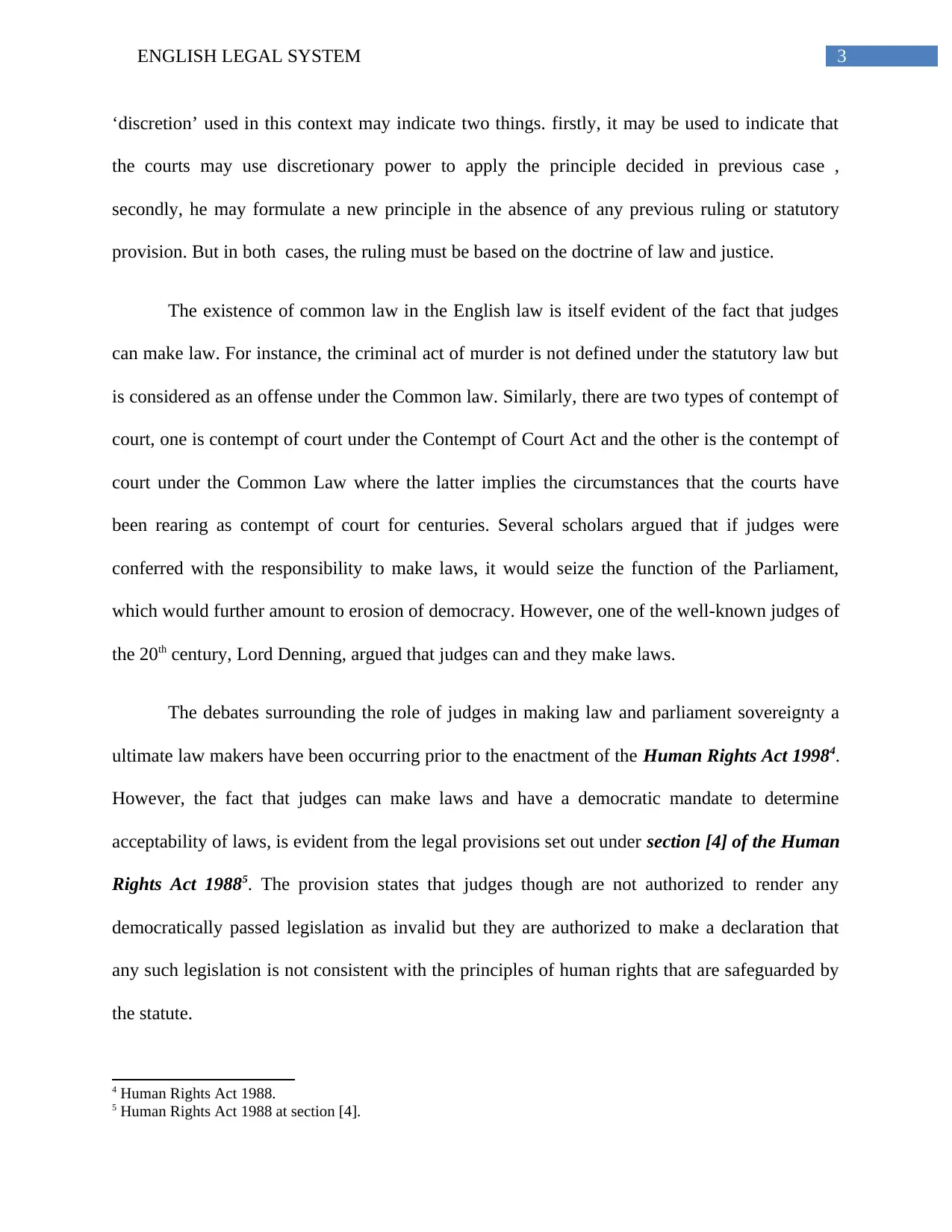
3ENGLISH LEGAL SYSTEM
‘discretion’ used in this context may indicate two things. firstly, it may be used to indicate that
the courts may use discretionary power to apply the principle decided in previous case ,
secondly, he may formulate a new principle in the absence of any previous ruling or statutory
provision. But in both cases, the ruling must be based on the doctrine of law and justice.
The existence of common law in the English law is itself evident of the fact that judges
can make law. For instance, the criminal act of murder is not defined under the statutory law but
is considered as an offense under the Common law. Similarly, there are two types of contempt of
court, one is contempt of court under the Contempt of Court Act and the other is the contempt of
court under the Common Law where the latter implies the circumstances that the courts have
been rearing as contempt of court for centuries. Several scholars argued that if judges were
conferred with the responsibility to make laws, it would seize the function of the Parliament,
which would further amount to erosion of democracy. However, one of the well-known judges of
the 20th century, Lord Denning, argued that judges can and they make laws.
The debates surrounding the role of judges in making law and parliament sovereignty a
ultimate law makers have been occurring prior to the enactment of the Human Rights Act 19984.
However, the fact that judges can make laws and have a democratic mandate to determine
acceptability of laws, is evident from the legal provisions set out under section [4] of the Human
Rights Act 19885. The provision states that judges though are not authorized to render any
democratically passed legislation as invalid but they are authorized to make a declaration that
any such legislation is not consistent with the principles of human rights that are safeguarded by
the statute.
4 Human Rights Act 1988.
5 Human Rights Act 1988 at section [4].
‘discretion’ used in this context may indicate two things. firstly, it may be used to indicate that
the courts may use discretionary power to apply the principle decided in previous case ,
secondly, he may formulate a new principle in the absence of any previous ruling or statutory
provision. But in both cases, the ruling must be based on the doctrine of law and justice.
The existence of common law in the English law is itself evident of the fact that judges
can make law. For instance, the criminal act of murder is not defined under the statutory law but
is considered as an offense under the Common law. Similarly, there are two types of contempt of
court, one is contempt of court under the Contempt of Court Act and the other is the contempt of
court under the Common Law where the latter implies the circumstances that the courts have
been rearing as contempt of court for centuries. Several scholars argued that if judges were
conferred with the responsibility to make laws, it would seize the function of the Parliament,
which would further amount to erosion of democracy. However, one of the well-known judges of
the 20th century, Lord Denning, argued that judges can and they make laws.
The debates surrounding the role of judges in making law and parliament sovereignty a
ultimate law makers have been occurring prior to the enactment of the Human Rights Act 19984.
However, the fact that judges can make laws and have a democratic mandate to determine
acceptability of laws, is evident from the legal provisions set out under section [4] of the Human
Rights Act 19885. The provision states that judges though are not authorized to render any
democratically passed legislation as invalid but they are authorized to make a declaration that
any such legislation is not consistent with the principles of human rights that are safeguarded by
the statute.
4 Human Rights Act 1988.
5 Human Rights Act 1988 at section [4].
Paraphrase This Document
Need a fresh take? Get an instant paraphrase of this document with our AI Paraphraser
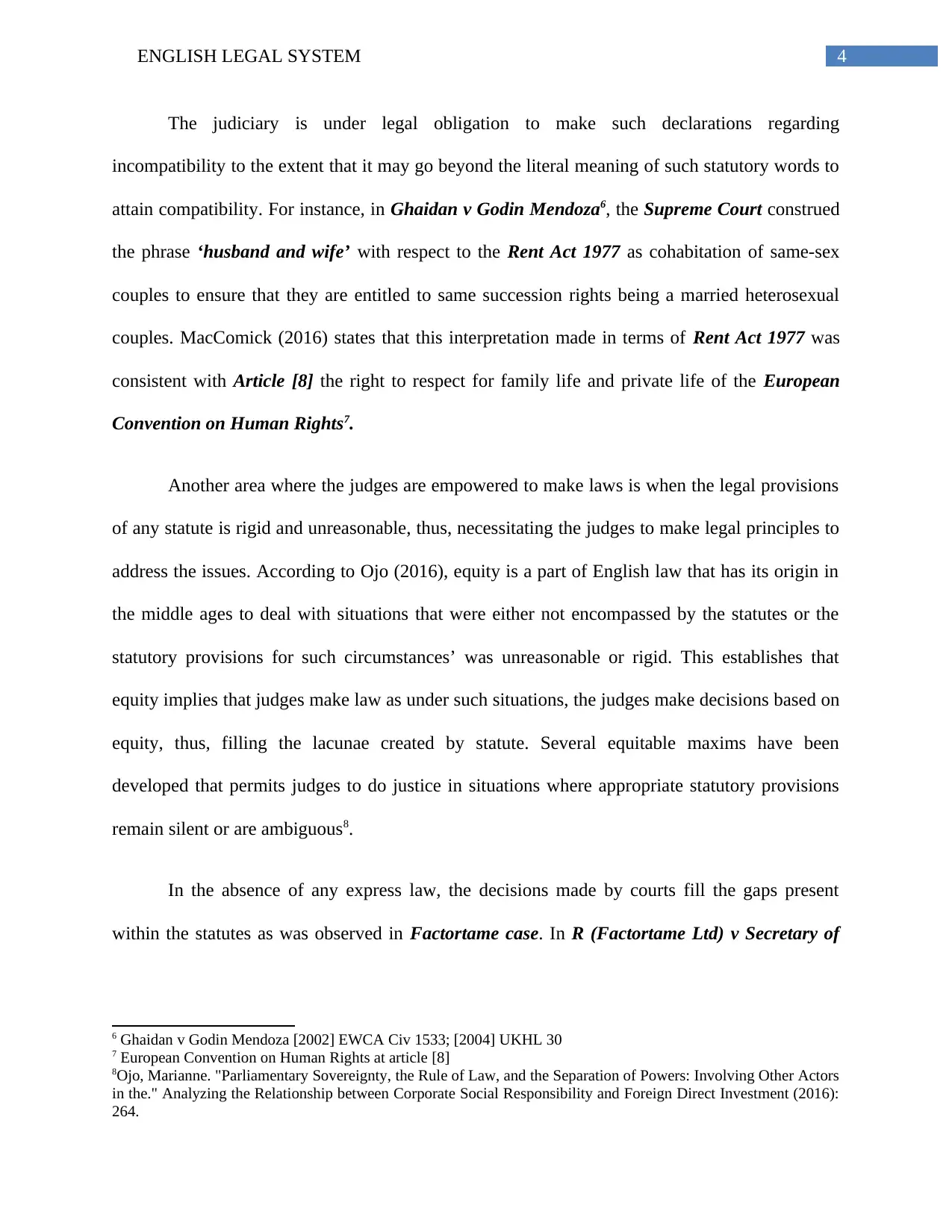
4ENGLISH LEGAL SYSTEM
The judiciary is under legal obligation to make such declarations regarding
incompatibility to the extent that it may go beyond the literal meaning of such statutory words to
attain compatibility. For instance, in Ghaidan v Godin Mendoza6, the Supreme Court construed
the phrase ‘husband and wife’ with respect to the Rent Act 1977 as cohabitation of same-sex
couples to ensure that they are entitled to same succession rights being a married heterosexual
couples. MacComick (2016) states that this interpretation made in terms of Rent Act 1977 was
consistent with Article [8] the right to respect for family life and private life of the European
Convention on Human Rights7.
Another area where the judges are empowered to make laws is when the legal provisions
of any statute is rigid and unreasonable, thus, necessitating the judges to make legal principles to
address the issues. According to Ojo (2016), equity is a part of English law that has its origin in
the middle ages to deal with situations that were either not encompassed by the statutes or the
statutory provisions for such circumstances’ was unreasonable or rigid. This establishes that
equity implies that judges make law as under such situations, the judges make decisions based on
equity, thus, filling the lacunae created by statute. Several equitable maxims have been
developed that permits judges to do justice in situations where appropriate statutory provisions
remain silent or are ambiguous8.
In the absence of any express law, the decisions made by courts fill the gaps present
within the statutes as was observed in Factortame case. In R (Factortame Ltd) v Secretary of
6 Ghaidan v Godin Mendoza [2002] EWCA Civ 1533; [2004] UKHL 30
7 European Convention on Human Rights at article [8]
8Ojo, Marianne. "Parliamentary Sovereignty, the Rule of Law, and the Separation of Powers: Involving Other Actors
in the." Analyzing the Relationship between Corporate Social Responsibility and Foreign Direct Investment (2016):
264.
The judiciary is under legal obligation to make such declarations regarding
incompatibility to the extent that it may go beyond the literal meaning of such statutory words to
attain compatibility. For instance, in Ghaidan v Godin Mendoza6, the Supreme Court construed
the phrase ‘husband and wife’ with respect to the Rent Act 1977 as cohabitation of same-sex
couples to ensure that they are entitled to same succession rights being a married heterosexual
couples. MacComick (2016) states that this interpretation made in terms of Rent Act 1977 was
consistent with Article [8] the right to respect for family life and private life of the European
Convention on Human Rights7.
Another area where the judges are empowered to make laws is when the legal provisions
of any statute is rigid and unreasonable, thus, necessitating the judges to make legal principles to
address the issues. According to Ojo (2016), equity is a part of English law that has its origin in
the middle ages to deal with situations that were either not encompassed by the statutes or the
statutory provisions for such circumstances’ was unreasonable or rigid. This establishes that
equity implies that judges make law as under such situations, the judges make decisions based on
equity, thus, filling the lacunae created by statute. Several equitable maxims have been
developed that permits judges to do justice in situations where appropriate statutory provisions
remain silent or are ambiguous8.
In the absence of any express law, the decisions made by courts fill the gaps present
within the statutes as was observed in Factortame case. In R (Factortame Ltd) v Secretary of
6 Ghaidan v Godin Mendoza [2002] EWCA Civ 1533; [2004] UKHL 30
7 European Convention on Human Rights at article [8]
8Ojo, Marianne. "Parliamentary Sovereignty, the Rule of Law, and the Separation of Powers: Involving Other Actors
in the." Analyzing the Relationship between Corporate Social Responsibility and Foreign Direct Investment (2016):
264.
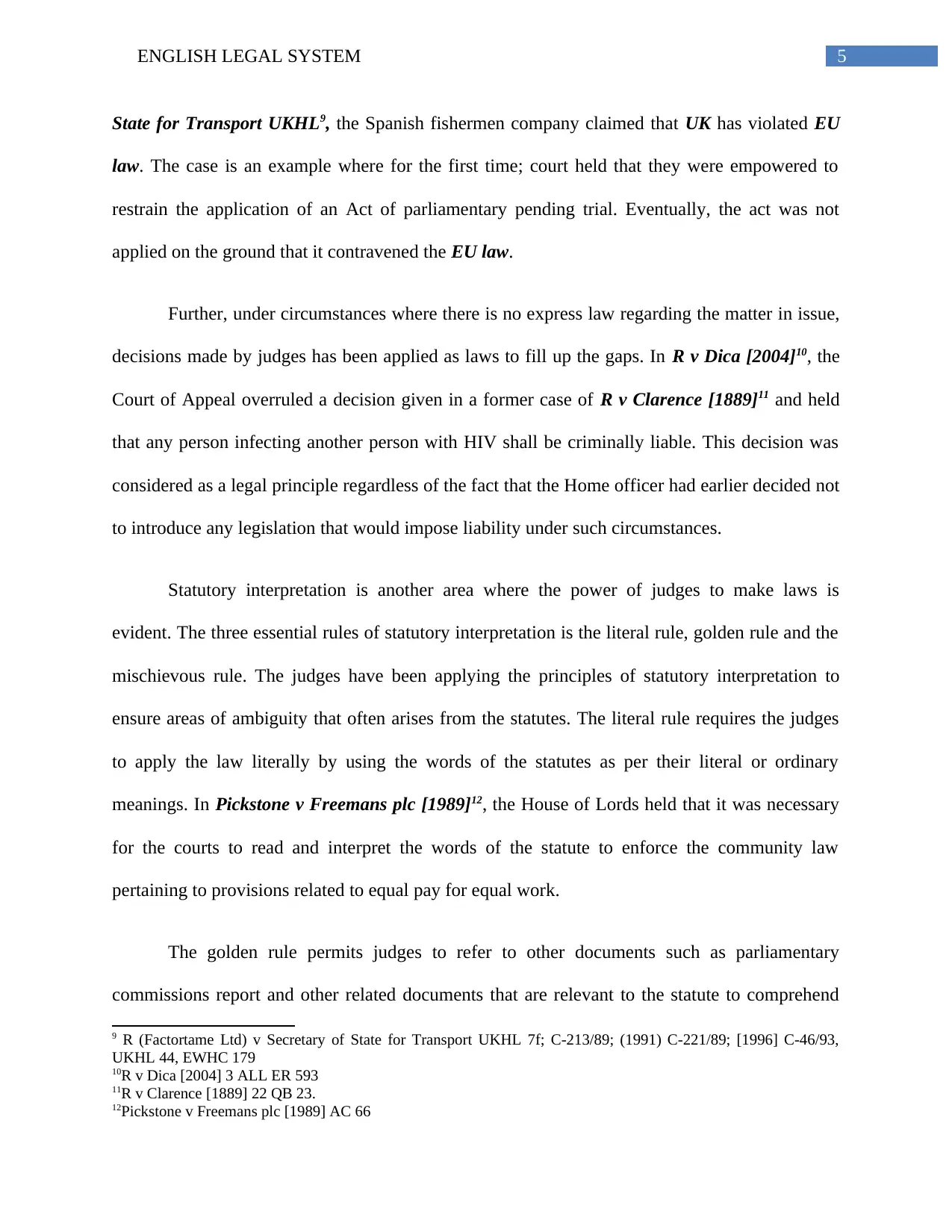
5ENGLISH LEGAL SYSTEM
State for Transport UKHL9, the Spanish fishermen company claimed that UK has violated EU
law. The case is an example where for the first time; court held that they were empowered to
restrain the application of an Act of parliamentary pending trial. Eventually, the act was not
applied on the ground that it contravened the EU law.
Further, under circumstances where there is no express law regarding the matter in issue,
decisions made by judges has been applied as laws to fill up the gaps. In R v Dica [2004]10, the
Court of Appeal overruled a decision given in a former case of R v Clarence [1889]11 and held
that any person infecting another person with HIV shall be criminally liable. This decision was
considered as a legal principle regardless of the fact that the Home officer had earlier decided not
to introduce any legislation that would impose liability under such circumstances.
Statutory interpretation is another area where the power of judges to make laws is
evident. The three essential rules of statutory interpretation is the literal rule, golden rule and the
mischievous rule. The judges have been applying the principles of statutory interpretation to
ensure areas of ambiguity that often arises from the statutes. The literal rule requires the judges
to apply the law literally by using the words of the statutes as per their literal or ordinary
meanings. In Pickstone v Freemans plc [1989]12, the House of Lords held that it was necessary
for the courts to read and interpret the words of the statute to enforce the community law
pertaining to provisions related to equal pay for equal work.
The golden rule permits judges to refer to other documents such as parliamentary
commissions report and other related documents that are relevant to the statute to comprehend
9 R (Factortame Ltd) v Secretary of State for Transport UKHL 7f; C-213/89; (1991) C-221/89; [1996] C-46/93,
UKHL 44, EWHC 179
10R v Dica [2004] 3 ALL ER 593
11R v Clarence [1889] 22 QB 23.
12Pickstone v Freemans plc [1989] AC 66
State for Transport UKHL9, the Spanish fishermen company claimed that UK has violated EU
law. The case is an example where for the first time; court held that they were empowered to
restrain the application of an Act of parliamentary pending trial. Eventually, the act was not
applied on the ground that it contravened the EU law.
Further, under circumstances where there is no express law regarding the matter in issue,
decisions made by judges has been applied as laws to fill up the gaps. In R v Dica [2004]10, the
Court of Appeal overruled a decision given in a former case of R v Clarence [1889]11 and held
that any person infecting another person with HIV shall be criminally liable. This decision was
considered as a legal principle regardless of the fact that the Home officer had earlier decided not
to introduce any legislation that would impose liability under such circumstances.
Statutory interpretation is another area where the power of judges to make laws is
evident. The three essential rules of statutory interpretation is the literal rule, golden rule and the
mischievous rule. The judges have been applying the principles of statutory interpretation to
ensure areas of ambiguity that often arises from the statutes. The literal rule requires the judges
to apply the law literally by using the words of the statutes as per their literal or ordinary
meanings. In Pickstone v Freemans plc [1989]12, the House of Lords held that it was necessary
for the courts to read and interpret the words of the statute to enforce the community law
pertaining to provisions related to equal pay for equal work.
The golden rule permits judges to refer to other documents such as parliamentary
commissions report and other related documents that are relevant to the statute to comprehend
9 R (Factortame Ltd) v Secretary of State for Transport UKHL 7f; C-213/89; (1991) C-221/89; [1996] C-46/93,
UKHL 44, EWHC 179
10R v Dica [2004] 3 ALL ER 593
11R v Clarence [1889] 22 QB 23.
12Pickstone v Freemans plc [1989] AC 66
⊘ This is a preview!⊘
Do you want full access?
Subscribe today to unlock all pages.

Trusted by 1+ million students worldwide
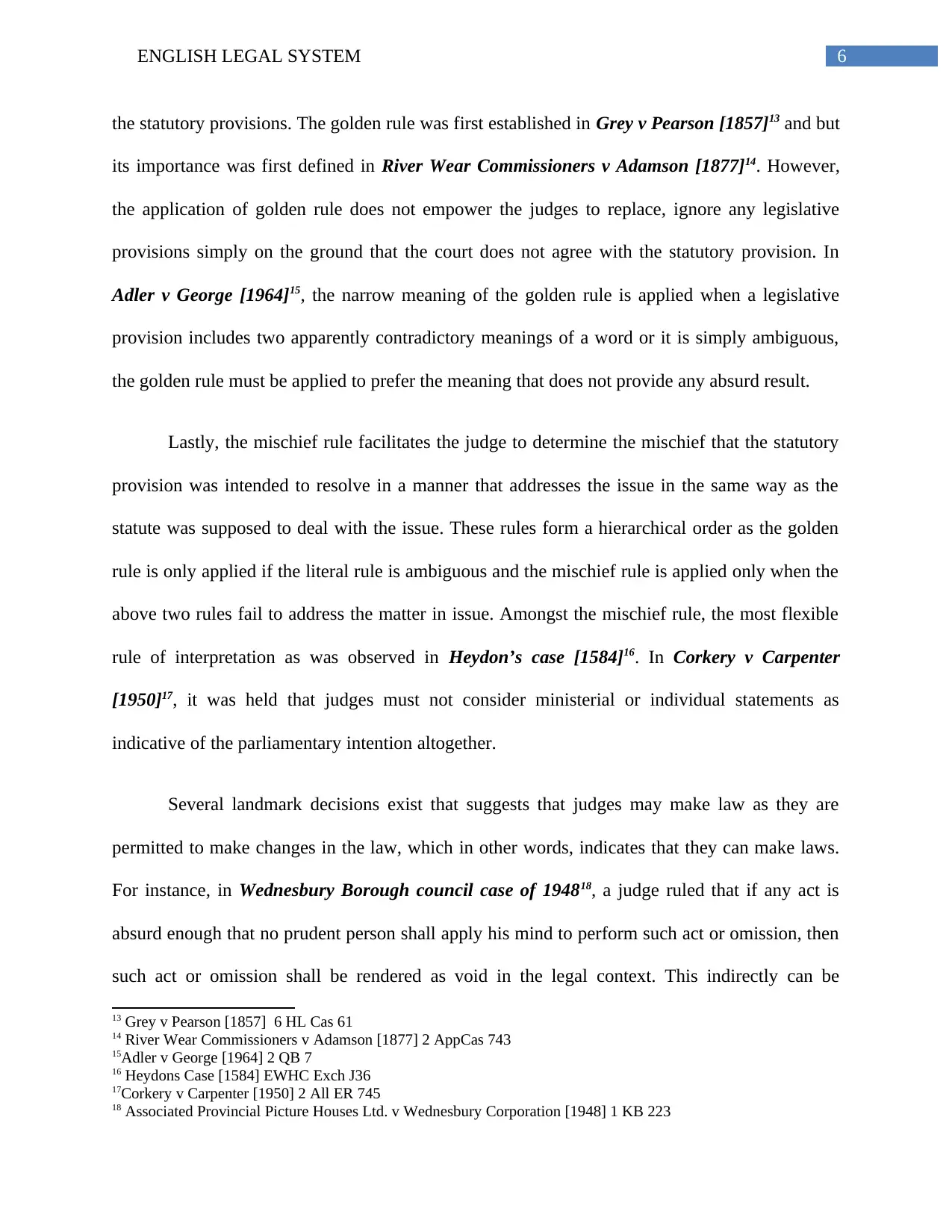
6ENGLISH LEGAL SYSTEM
the statutory provisions. The golden rule was first established in Grey v Pearson [1857]13 and but
its importance was first defined in River Wear Commissioners v Adamson [1877]14. However,
the application of golden rule does not empower the judges to replace, ignore any legislative
provisions simply on the ground that the court does not agree with the statutory provision. In
Adler v George [1964]15, the narrow meaning of the golden rule is applied when a legislative
provision includes two apparently contradictory meanings of a word or it is simply ambiguous,
the golden rule must be applied to prefer the meaning that does not provide any absurd result.
Lastly, the mischief rule facilitates the judge to determine the mischief that the statutory
provision was intended to resolve in a manner that addresses the issue in the same way as the
statute was supposed to deal with the issue. These rules form a hierarchical order as the golden
rule is only applied if the literal rule is ambiguous and the mischief rule is applied only when the
above two rules fail to address the matter in issue. Amongst the mischief rule, the most flexible
rule of interpretation as was observed in Heydon’s case [1584]16. In Corkery v Carpenter
[1950]17, it was held that judges must not consider ministerial or individual statements as
indicative of the parliamentary intention altogether.
Several landmark decisions exist that suggests that judges may make law as they are
permitted to make changes in the law, which in other words, indicates that they can make laws.
For instance, in Wednesbury Borough council case of 194818, a judge ruled that if any act is
absurd enough that no prudent person shall apply his mind to perform such act or omission, then
such act or omission shall be rendered as void in the legal context. This indirectly can be
13 Grey v Pearson [1857] 6 HL Cas 61
14 River Wear Commissioners v Adamson [1877] 2 AppCas 743
15Adler v George [1964] 2 QB 7
16 Heydons Case [1584] EWHC Exch J36
17Corkery v Carpenter [1950] 2 All ER 745
18 Associated Provincial Picture Houses Ltd. v Wednesbury Corporation [1948] 1 KB 223
the statutory provisions. The golden rule was first established in Grey v Pearson [1857]13 and but
its importance was first defined in River Wear Commissioners v Adamson [1877]14. However,
the application of golden rule does not empower the judges to replace, ignore any legislative
provisions simply on the ground that the court does not agree with the statutory provision. In
Adler v George [1964]15, the narrow meaning of the golden rule is applied when a legislative
provision includes two apparently contradictory meanings of a word or it is simply ambiguous,
the golden rule must be applied to prefer the meaning that does not provide any absurd result.
Lastly, the mischief rule facilitates the judge to determine the mischief that the statutory
provision was intended to resolve in a manner that addresses the issue in the same way as the
statute was supposed to deal with the issue. These rules form a hierarchical order as the golden
rule is only applied if the literal rule is ambiguous and the mischief rule is applied only when the
above two rules fail to address the matter in issue. Amongst the mischief rule, the most flexible
rule of interpretation as was observed in Heydon’s case [1584]16. In Corkery v Carpenter
[1950]17, it was held that judges must not consider ministerial or individual statements as
indicative of the parliamentary intention altogether.
Several landmark decisions exist that suggests that judges may make law as they are
permitted to make changes in the law, which in other words, indicates that they can make laws.
For instance, in Wednesbury Borough council case of 194818, a judge ruled that if any act is
absurd enough that no prudent person shall apply his mind to perform such act or omission, then
such act or omission shall be rendered as void in the legal context. This indirectly can be
13 Grey v Pearson [1857] 6 HL Cas 61
14 River Wear Commissioners v Adamson [1877] 2 AppCas 743
15Adler v George [1964] 2 QB 7
16 Heydons Case [1584] EWHC Exch J36
17Corkery v Carpenter [1950] 2 All ER 745
18 Associated Provincial Picture Houses Ltd. v Wednesbury Corporation [1948] 1 KB 223
Paraphrase This Document
Need a fresh take? Get an instant paraphrase of this document with our AI Paraphraser
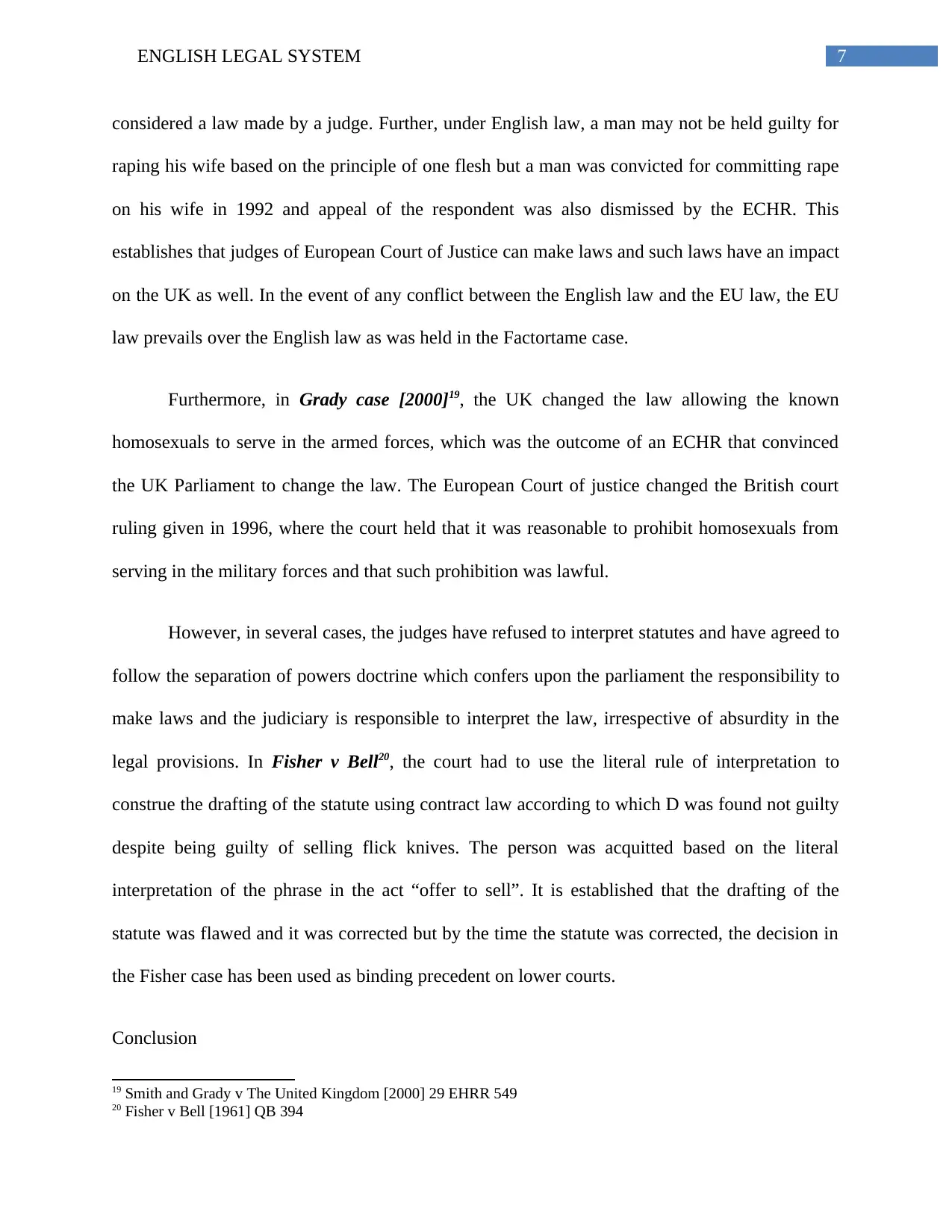
7ENGLISH LEGAL SYSTEM
considered a law made by a judge. Further, under English law, a man may not be held guilty for
raping his wife based on the principle of one flesh but a man was convicted for committing rape
on his wife in 1992 and appeal of the respondent was also dismissed by the ECHR. This
establishes that judges of European Court of Justice can make laws and such laws have an impact
on the UK as well. In the event of any conflict between the English law and the EU law, the EU
law prevails over the English law as was held in the Factortame case.
Furthermore, in Grady case [2000]19, the UK changed the law allowing the known
homosexuals to serve in the armed forces, which was the outcome of an ECHR that convinced
the UK Parliament to change the law. The European Court of justice changed the British court
ruling given in 1996, where the court held that it was reasonable to prohibit homosexuals from
serving in the military forces and that such prohibition was lawful.
However, in several cases, the judges have refused to interpret statutes and have agreed to
follow the separation of powers doctrine which confers upon the parliament the responsibility to
make laws and the judiciary is responsible to interpret the law, irrespective of absurdity in the
legal provisions. In Fisher v Bell20, the court had to use the literal rule of interpretation to
construe the drafting of the statute using contract law according to which D was found not guilty
despite being guilty of selling flick knives. The person was acquitted based on the literal
interpretation of the phrase in the act “offer to sell”. It is established that the drafting of the
statute was flawed and it was corrected but by the time the statute was corrected, the decision in
the Fisher case has been used as binding precedent on lower courts.
Conclusion
19 Smith and Grady v The United Kingdom [2000] 29 EHRR 549
20 Fisher v Bell [1961] QB 394
considered a law made by a judge. Further, under English law, a man may not be held guilty for
raping his wife based on the principle of one flesh but a man was convicted for committing rape
on his wife in 1992 and appeal of the respondent was also dismissed by the ECHR. This
establishes that judges of European Court of Justice can make laws and such laws have an impact
on the UK as well. In the event of any conflict between the English law and the EU law, the EU
law prevails over the English law as was held in the Factortame case.
Furthermore, in Grady case [2000]19, the UK changed the law allowing the known
homosexuals to serve in the armed forces, which was the outcome of an ECHR that convinced
the UK Parliament to change the law. The European Court of justice changed the British court
ruling given in 1996, where the court held that it was reasonable to prohibit homosexuals from
serving in the military forces and that such prohibition was lawful.
However, in several cases, the judges have refused to interpret statutes and have agreed to
follow the separation of powers doctrine which confers upon the parliament the responsibility to
make laws and the judiciary is responsible to interpret the law, irrespective of absurdity in the
legal provisions. In Fisher v Bell20, the court had to use the literal rule of interpretation to
construe the drafting of the statute using contract law according to which D was found not guilty
despite being guilty of selling flick knives. The person was acquitted based on the literal
interpretation of the phrase in the act “offer to sell”. It is established that the drafting of the
statute was flawed and it was corrected but by the time the statute was corrected, the decision in
the Fisher case has been used as binding precedent on lower courts.
Conclusion
19 Smith and Grady v The United Kingdom [2000] 29 EHRR 549
20 Fisher v Bell [1961] QB 394
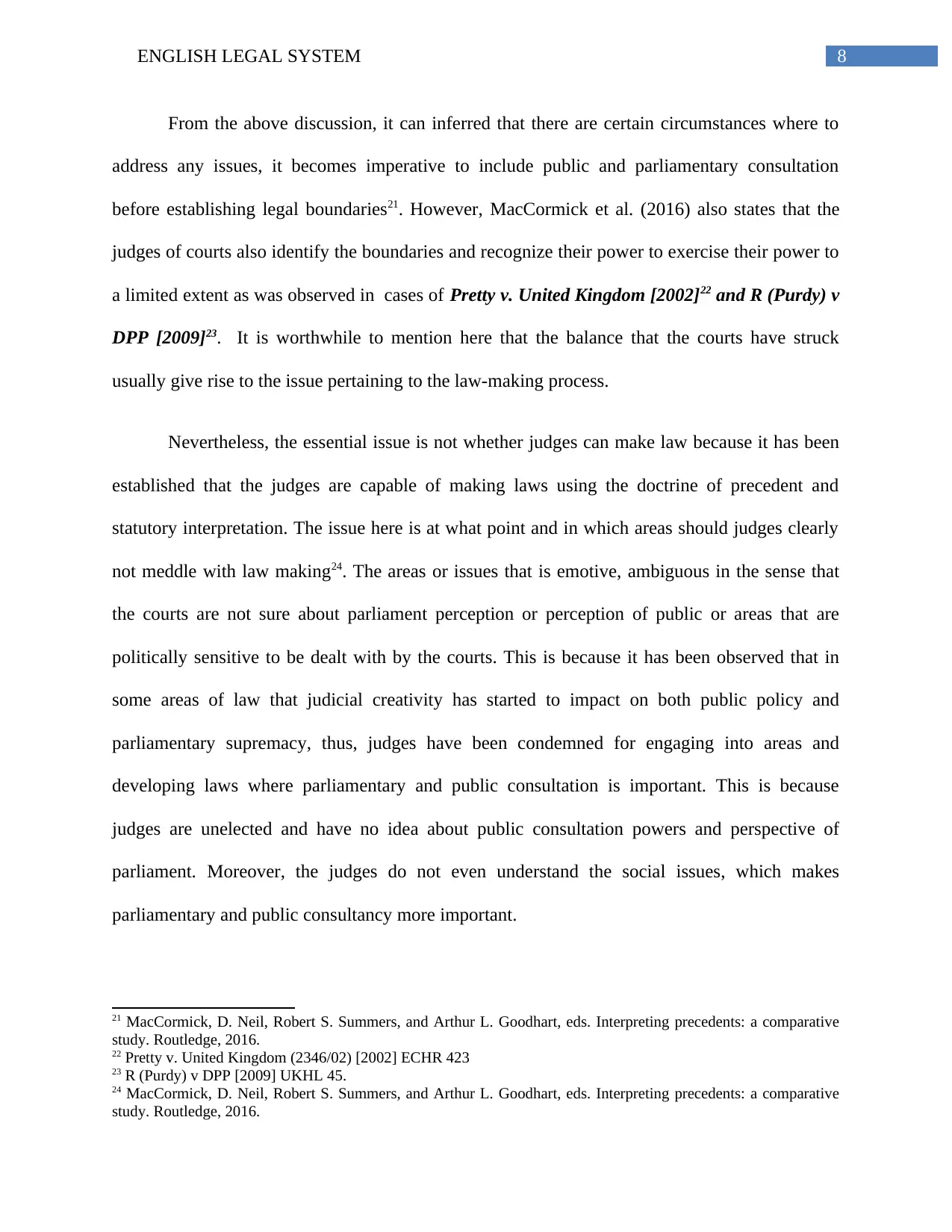
8ENGLISH LEGAL SYSTEM
From the above discussion, it can inferred that there are certain circumstances where to
address any issues, it becomes imperative to include public and parliamentary consultation
before establishing legal boundaries21. However, MacCormick et al. (2016) also states that the
judges of courts also identify the boundaries and recognize their power to exercise their power to
a limited extent as was observed in cases of Pretty v. United Kingdom [2002]22 and R (Purdy) v
DPP [2009]23. It is worthwhile to mention here that the balance that the courts have struck
usually give rise to the issue pertaining to the law-making process.
Nevertheless, the essential issue is not whether judges can make law because it has been
established that the judges are capable of making laws using the doctrine of precedent and
statutory interpretation. The issue here is at what point and in which areas should judges clearly
not meddle with law making24. The areas or issues that is emotive, ambiguous in the sense that
the courts are not sure about parliament perception or perception of public or areas that are
politically sensitive to be dealt with by the courts. This is because it has been observed that in
some areas of law that judicial creativity has started to impact on both public policy and
parliamentary supremacy, thus, judges have been condemned for engaging into areas and
developing laws where parliamentary and public consultation is important. This is because
judges are unelected and have no idea about public consultation powers and perspective of
parliament. Moreover, the judges do not even understand the social issues, which makes
parliamentary and public consultancy more important.
21 MacCormick, D. Neil, Robert S. Summers, and Arthur L. Goodhart, eds. Interpreting precedents: a comparative
study. Routledge, 2016.
22 Pretty v. United Kingdom (2346/02) [2002] ECHR 423
23 R (Purdy) v DPP [2009] UKHL 45.
24 MacCormick, D. Neil, Robert S. Summers, and Arthur L. Goodhart, eds. Interpreting precedents: a comparative
study. Routledge, 2016.
From the above discussion, it can inferred that there are certain circumstances where to
address any issues, it becomes imperative to include public and parliamentary consultation
before establishing legal boundaries21. However, MacCormick et al. (2016) also states that the
judges of courts also identify the boundaries and recognize their power to exercise their power to
a limited extent as was observed in cases of Pretty v. United Kingdom [2002]22 and R (Purdy) v
DPP [2009]23. It is worthwhile to mention here that the balance that the courts have struck
usually give rise to the issue pertaining to the law-making process.
Nevertheless, the essential issue is not whether judges can make law because it has been
established that the judges are capable of making laws using the doctrine of precedent and
statutory interpretation. The issue here is at what point and in which areas should judges clearly
not meddle with law making24. The areas or issues that is emotive, ambiguous in the sense that
the courts are not sure about parliament perception or perception of public or areas that are
politically sensitive to be dealt with by the courts. This is because it has been observed that in
some areas of law that judicial creativity has started to impact on both public policy and
parliamentary supremacy, thus, judges have been condemned for engaging into areas and
developing laws where parliamentary and public consultation is important. This is because
judges are unelected and have no idea about public consultation powers and perspective of
parliament. Moreover, the judges do not even understand the social issues, which makes
parliamentary and public consultancy more important.
21 MacCormick, D. Neil, Robert S. Summers, and Arthur L. Goodhart, eds. Interpreting precedents: a comparative
study. Routledge, 2016.
22 Pretty v. United Kingdom (2346/02) [2002] ECHR 423
23 R (Purdy) v DPP [2009] UKHL 45.
24 MacCormick, D. Neil, Robert S. Summers, and Arthur L. Goodhart, eds. Interpreting precedents: a comparative
study. Routledge, 2016.
⊘ This is a preview!⊘
Do you want full access?
Subscribe today to unlock all pages.

Trusted by 1+ million students worldwide
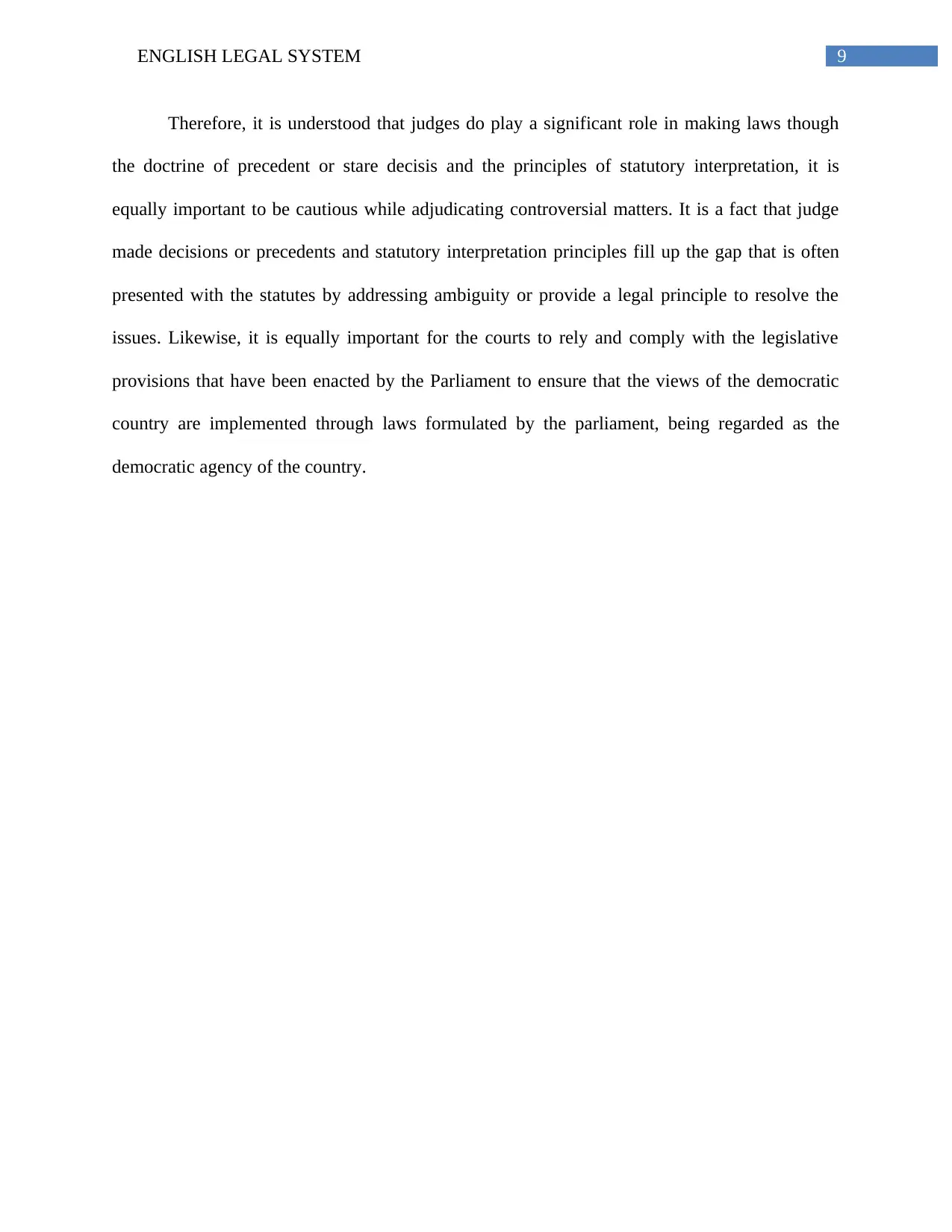
9ENGLISH LEGAL SYSTEM
Therefore, it is understood that judges do play a significant role in making laws though
the doctrine of precedent or stare decisis and the principles of statutory interpretation, it is
equally important to be cautious while adjudicating controversial matters. It is a fact that judge
made decisions or precedents and statutory interpretation principles fill up the gap that is often
presented with the statutes by addressing ambiguity or provide a legal principle to resolve the
issues. Likewise, it is equally important for the courts to rely and comply with the legislative
provisions that have been enacted by the Parliament to ensure that the views of the democratic
country are implemented through laws formulated by the parliament, being regarded as the
democratic agency of the country.
Therefore, it is understood that judges do play a significant role in making laws though
the doctrine of precedent or stare decisis and the principles of statutory interpretation, it is
equally important to be cautious while adjudicating controversial matters. It is a fact that judge
made decisions or precedents and statutory interpretation principles fill up the gap that is often
presented with the statutes by addressing ambiguity or provide a legal principle to resolve the
issues. Likewise, it is equally important for the courts to rely and comply with the legislative
provisions that have been enacted by the Parliament to ensure that the views of the democratic
country are implemented through laws formulated by the parliament, being regarded as the
democratic agency of the country.
Paraphrase This Document
Need a fresh take? Get an instant paraphrase of this document with our AI Paraphraser
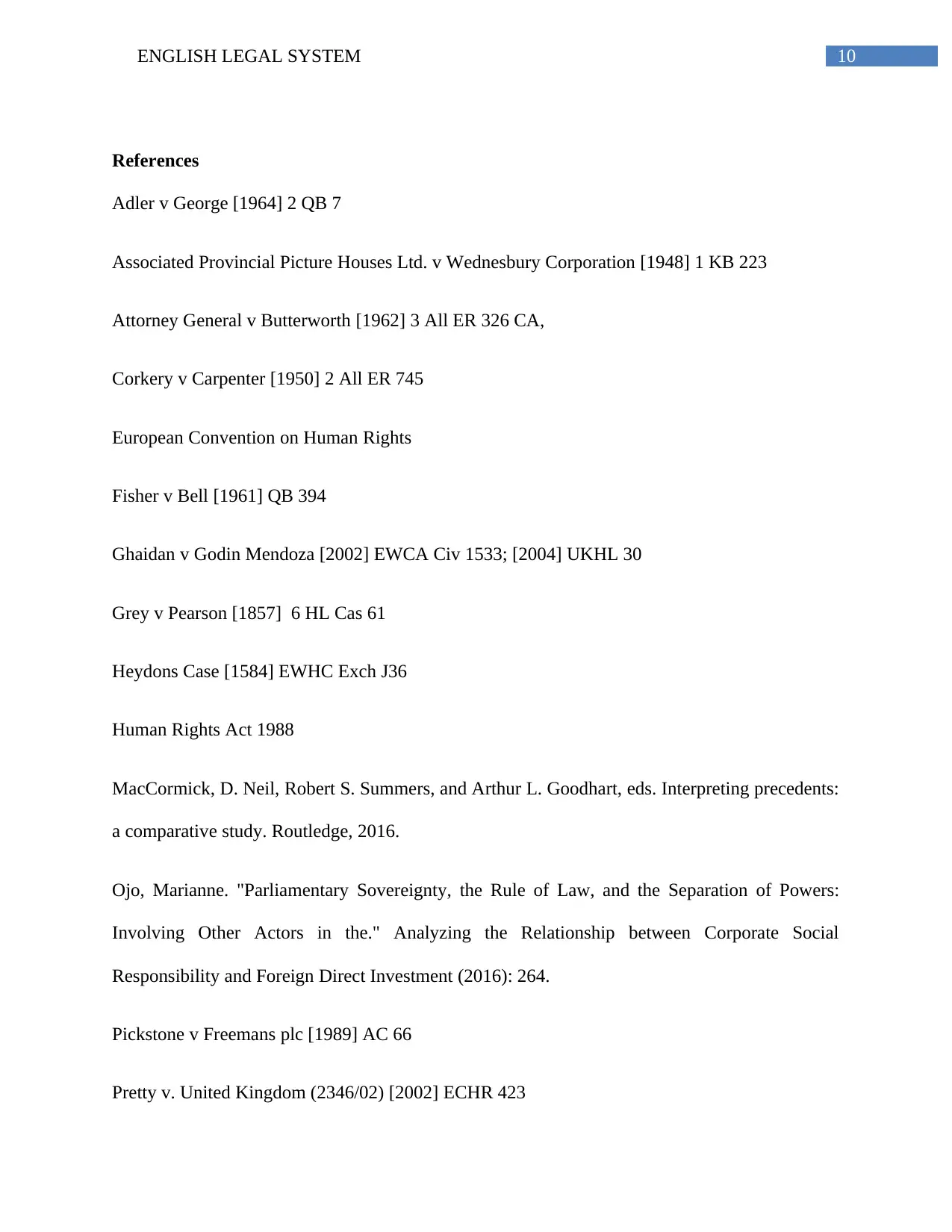
10ENGLISH LEGAL SYSTEM
References
Adler v George [1964] 2 QB 7
Associated Provincial Picture Houses Ltd. v Wednesbury Corporation [1948] 1 KB 223
Attorney General v Butterworth [1962] 3 All ER 326 CA,
Corkery v Carpenter [1950] 2 All ER 745
European Convention on Human Rights
Fisher v Bell [1961] QB 394
Ghaidan v Godin Mendoza [2002] EWCA Civ 1533; [2004] UKHL 30
Grey v Pearson [1857] 6 HL Cas 61
Heydons Case [1584] EWHC Exch J36
Human Rights Act 1988
MacCormick, D. Neil, Robert S. Summers, and Arthur L. Goodhart, eds. Interpreting precedents:
a comparative study. Routledge, 2016.
Ojo, Marianne. "Parliamentary Sovereignty, the Rule of Law, and the Separation of Powers:
Involving Other Actors in the." Analyzing the Relationship between Corporate Social
Responsibility and Foreign Direct Investment (2016): 264.
Pickstone v Freemans plc [1989] AC 66
Pretty v. United Kingdom (2346/02) [2002] ECHR 423
References
Adler v George [1964] 2 QB 7
Associated Provincial Picture Houses Ltd. v Wednesbury Corporation [1948] 1 KB 223
Attorney General v Butterworth [1962] 3 All ER 326 CA,
Corkery v Carpenter [1950] 2 All ER 745
European Convention on Human Rights
Fisher v Bell [1961] QB 394
Ghaidan v Godin Mendoza [2002] EWCA Civ 1533; [2004] UKHL 30
Grey v Pearson [1857] 6 HL Cas 61
Heydons Case [1584] EWHC Exch J36
Human Rights Act 1988
MacCormick, D. Neil, Robert S. Summers, and Arthur L. Goodhart, eds. Interpreting precedents:
a comparative study. Routledge, 2016.
Ojo, Marianne. "Parliamentary Sovereignty, the Rule of Law, and the Separation of Powers:
Involving Other Actors in the." Analyzing the Relationship between Corporate Social
Responsibility and Foreign Direct Investment (2016): 264.
Pickstone v Freemans plc [1989] AC 66
Pretty v. United Kingdom (2346/02) [2002] ECHR 423
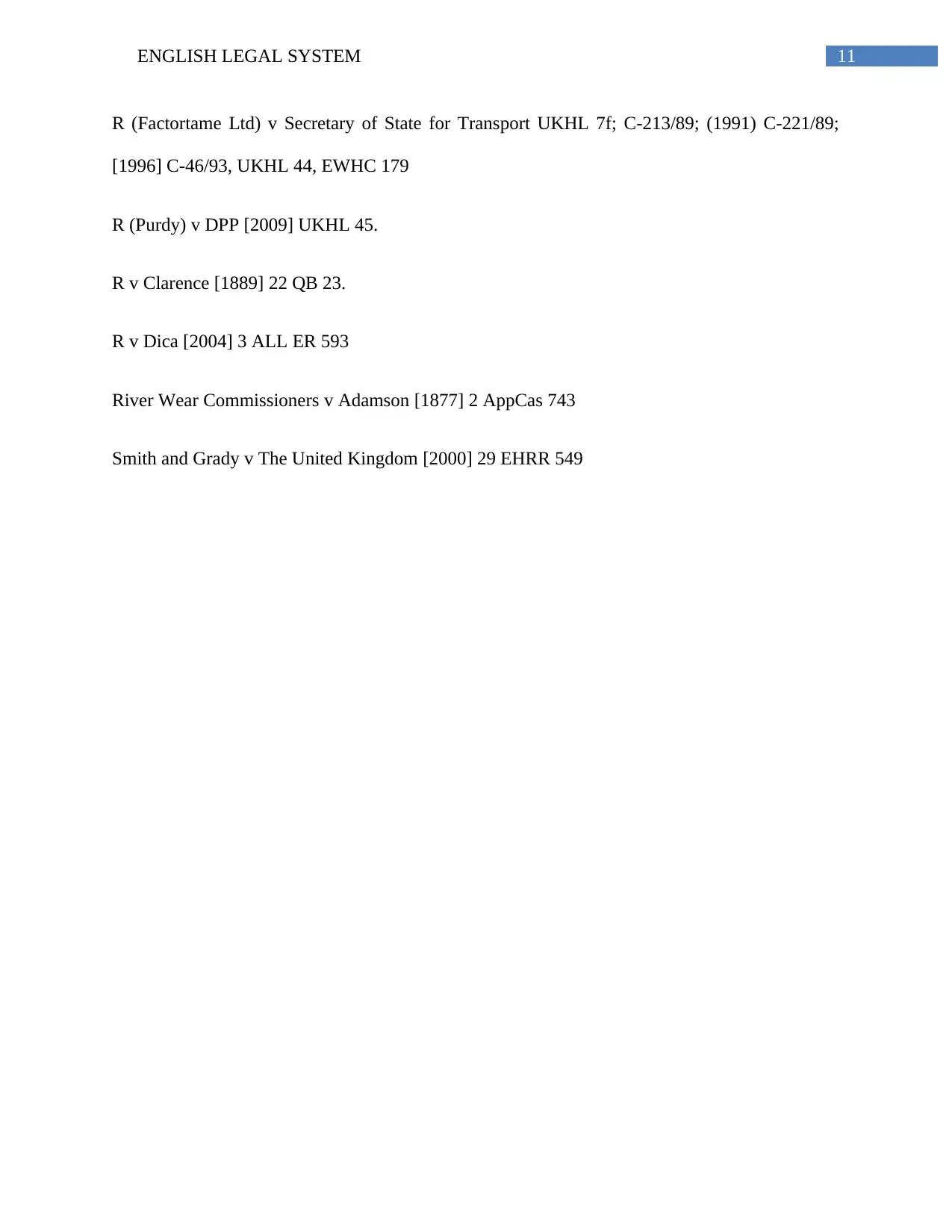
11ENGLISH LEGAL SYSTEM
R (Factortame Ltd) v Secretary of State for Transport UKHL 7f; C-213/89; (1991) C-221/89;
[1996] C-46/93, UKHL 44, EWHC 179
R (Purdy) v DPP [2009] UKHL 45.
R v Clarence [1889] 22 QB 23.
R v Dica [2004] 3 ALL ER 593
River Wear Commissioners v Adamson [1877] 2 AppCas 743
Smith and Grady v The United Kingdom [2000] 29 EHRR 549
R (Factortame Ltd) v Secretary of State for Transport UKHL 7f; C-213/89; (1991) C-221/89;
[1996] C-46/93, UKHL 44, EWHC 179
R (Purdy) v DPP [2009] UKHL 45.
R v Clarence [1889] 22 QB 23.
R v Dica [2004] 3 ALL ER 593
River Wear Commissioners v Adamson [1877] 2 AppCas 743
Smith and Grady v The United Kingdom [2000] 29 EHRR 549
⊘ This is a preview!⊘
Do you want full access?
Subscribe today to unlock all pages.

Trusted by 1+ million students worldwide
1 out of 12
Related Documents
Your All-in-One AI-Powered Toolkit for Academic Success.
+13062052269
info@desklib.com
Available 24*7 on WhatsApp / Email
![[object Object]](/_next/static/media/star-bottom.7253800d.svg)
Unlock your academic potential
Copyright © 2020–2026 A2Z Services. All Rights Reserved. Developed and managed by ZUCOL.





